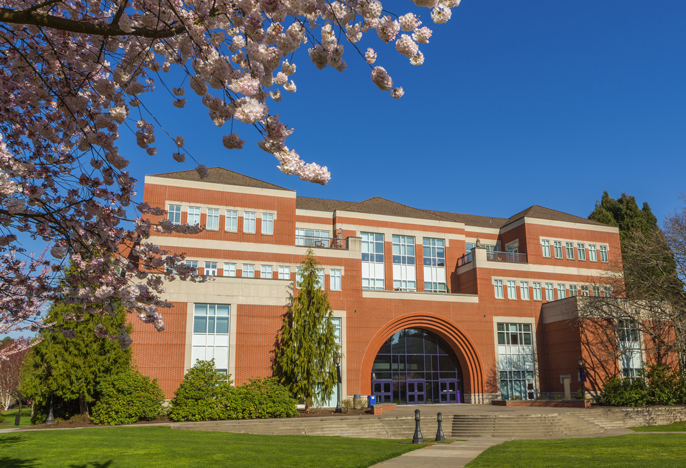
Waste Management: 99% of grounds waste is mulched or composted on campus, totaling around 200 yards/year.
Water Management: Maintains water retention basins and bioswales to assist with stormwater management, protect groundwater, and support local wildlife. We were 100% compliant in the last city inspections.
Native Planting: River Campus features nearly all native plants.
Reduced Herbicide Use: Transitioned from widespread spraying to minimal, targeted use, reducing chemical usage by 90%.
Smart Irrigation: Installing new management systems with weather sensors to avoid waste. Even though campus irrigation uses well water, we aim to use the resource responsibly.
Sustainable Fleet: 95% of hedge trimmers are electric. Transitioning to a fully electric fleet by 2026.
Recycling Education: Ongoing collaboration with Residence Life to improve waste diversion and recycling education. Learn more at our Recycling web page here.
Aqueous Ozone Cleaning: Implemented in multiple buildings to reduce chemical usage. Learn more about the product here.
Soap2O Pilot Program: Testing soap pods to minimize resource use and costs. Learn more about the product here.
Efficient Equipment: New cleaning tools that reduce water and chemical waste.
Move-Out Donations: Organized donation programs to repurpose surplus student items.
LED Lighting Conversions: Converted over 2,500 lights to LED in FY24.
Smart Lighting Controls: Standardizing and automating lighting controls to reduce waste.
Water Conservation: Installing low-flush diaphragms to lower water usage.
Sustainable Repairs: Prioritizing refurbishment over replacement for building appliances.
Optimized Setpoints: Adjusting schedules to minimize energy use while meeting building needs.
Preventative Maintenance: Staying ahead of issues to avoid energy waste and equipment failure.
Energy Trust of Oregon Partnership: Installed more efficient HVAC systems and earned incentives.
Steam System Improvements: Conducted major repairs and replaced steam traps for efficiency.
Efficient Operations: Minimizing vehicle trips to reduce emissions.
Furniture Repurposing: Weekly open hours for staff to repurpose campus furniture.
Recycling & Composting: Dedicated bins for scrap metal, wood, and food waste.
Energy Management: Tracking and optimizing energy usage in key buildings. Learn more about SEM here.
Building Operators Certification: Team leader's certification in sustainability-focused building operations.
Fleet Electrification: Transitioning the department’s fleet to electric vehicles.
Renewable Energy Commitment: Annual goal of decreasing electric and gas consumption by 3% per building.
Demand Response: Enrolled in PGE's Energy Partner On Demand program, which reduces our environmental impact by shifting energy use during peak times.

SEM Buildings:
Sustainability is a collective effort and responsibility of every individual. Each day we have the opportunity to make conscious decisions that result in a positive change for the world around us. Here at the Physical Plant, we are making significant strides in reducing energy usage and material consumption. Sustainability is an element we consider in every decision that we make. Many of our measurable efforts have resulted from our enrollment in a Strategic Energy Management program (SEM.)
What is Strategic Energy Management?
SEM is a cohort program run by the Energy Trust of Oregon, and the Physical Plant has been a member since 2015. There are ten on-campus buildings enrolled that we specifically track the gas and electricity usage, discuss the reasoning for an increase or decrease in savings, and then we strategize maintenance solutions to minimize energy usage.
Learn how you can get involved in our sustainability initiatives.